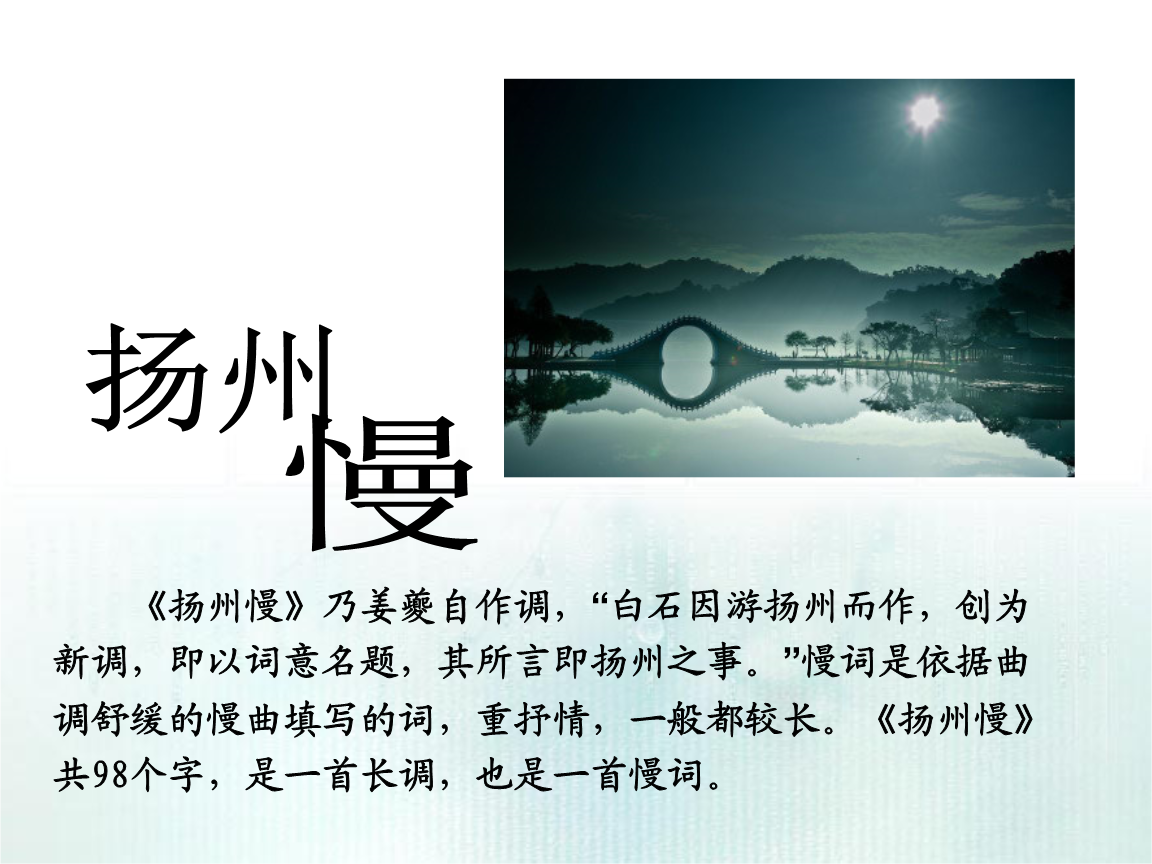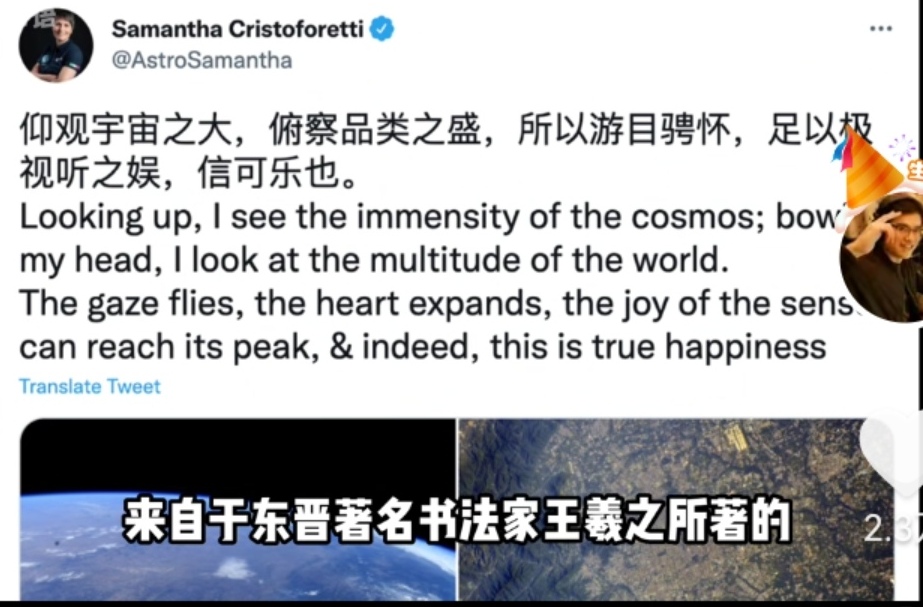Dear readers, today I want to share a famous Ci written by a poet named Jiang Kui/姜夔 during the Southern Song Dynasty. Maybe you are curious about what Ci is! Ci/词 is a kind of ancient Chinese poem which can be used for singing as lyrics to the special tune.
It is said that the author Jiang Kui wrote this famous Ci "Yangzhouman theme/扬州慢 when he was in his 20's (or exactly at 26 years old). Although he failed to pass the imperial examination, being a plain folk all his lifetime, he was a versatile artist, proficient in both poem/Ci and music, as well as calligraphy.
Without further ado, let's enjoy this "Yangzhouman Theme" together. Yangzhou is a city in the present Jiangsu Province. Man/慢 means slow pace.

扬州慢•怀左名都
姜夔
(丙申正日,予过维扬。夜雪初霁,荠麦弥望。入其城则四壁萧条,寒水自碧,暮色渐起,戍角悲吟。予怀怆然,感慨今昔,因自度此曲。千岩老人以为有《黍离》之悲也。)
淮左名都,竹西佳处,解鞍少驻初程。过春风十里,尽荠麦青青。自胡马窥江去后,废池乔木,犹厌言兵。渐黄昏、清角吹寒,都在空城。
杜郎俊赏,算而今重到须惊。纵豆蔻词工,青楼梦好,难赋深情。二十四桥仍在,波心荡冷月无声。念桥边红药,年年知为谁生。
What a pity! I can't find its complete English version by the classical translator Xu Yuanchong this time.
Below is just part of his translation:
二十四桥仍在,波心荡,冷月无声。
念桥边红药,年年知为谁生。
The Twenty-four Bridges can still beseen,
But the cold moon floating among,
The waves would no longer sing a song.
For whom shoulde the peonies near,
The Bridges grow red from year to year?
(I have to say that I'm rather puzzled at the word spelling--- "asong" and "shoulde". I doubt whether it is kind of spelling errors or a special kind of usage. If anyone could tell me about it, I would be appreciated very much.)
Here I get 2 kinds of its English versions, and you can judge which is your favorite by yourself.
the Tune of Yang Zhou Man
Jiang Kui
On the winter solstice in the third year (1176) of the reign of Chunxi I passed by Yangzhou. When the snow let up, a stretch of field cress met my eyes. I entered the city and looked around myself, only to see a desolate scene and freezing blue waters. As dusk deepened, horns could be heard from garrison barracks. Overwhelmed by grief, I composed this tune. In Xiao Dezao's opinion, my poem is evocative of the sadness expressed in the ancient lament "On a Fallen Capital."
At the famous city east of Huaihe River
And west of a stretch of bamboo
(Where the first stage of my journey ends),
I dismount to rest.
As I walk along the road
Once bathed in a reach of vernal breezes
I see green field cress on all sides.
Since Tartar cavalry pressed upon the Yangtze,
The city with abandoned moat and towering trees
Still hates all mention of the war.
As evening sets in, in the empty city
Chilly horns are echoing.
If Du Mu (1) the connoisseur of bygone beauty
Returned to life, he'd lament the lost glory.
His magic pen that described a cardamom-like girl
And dream-like time in blue mansions
Can no more tell a romantic story.
The twenty-bridges,
Upon which fairies once played their flutes,
Are still there;
And below, in ripples the silent moon glows.
But, oh, for whom the red peonies by the bridges
Bloom every spring? Who knows? Who knows?
(1)Du Mu (AD 837-852?)
, a poet of Yangzhou in Tang Dynasty, famous for his poems about the city and the beautiful women there.
Another English translation is:
Yangzhouman Theme: Famed Capital at East Road of Huainan (Jiang Kui)
On Winter Solstice Day, Bing Shen Month, Chun Xi Year,
I passed by Province Yangzhou. Sky at night cleared up after snow.
Growth of buckwheat in sight stretched endlessly. Upon entering the city, it was desolation everywhere. River water was chilly and greenish. Night veil slowly fell.
Mournful bugle sounds rang out. I was overwhelmed with gloom.
In lamenting over changes now from the past, I composed this song.
Qianyan elder(means Xiao Dezao/萧德藻 who was also a poet and one of relatives of Jiang Kui, alias Qianyan elder/千岩老人)thought its poignancy rivaled “Shuli/黍离”
(means “On a Fallen Capital").
The famed capital was at east road of Huainan.
Zhuxi Pavilion was a great sightseeing spot.
In this first trip, I removed saddle for short break.
Formerly, miles of booms were blessed by spring breeze.
Now they were taken over by greenish buckwheat.
Since Hu calvary’s plot on Yangtze area was over,
abandoned ponds and ancient trees
appeared as if they were tired of wars.
As night descended,
chilly distinct bugle sound waves
echoed around the empty city.
Du Mu had good taste in fine things.
If he were here today,
he would be greatly shocked.
Even with his knack in depicting early teen maiden,
or idealistic dreams in brothel,
he couldn’t portrait the lacerating sentiments now.
Twenty-four bridges were still around.
Water in mid-river was rippling.
The heartless moon didn’t make a sound.
I wondered the red peonies beside the bridge,
for whom would they be flowering yearly?
Notes: Both Tartar cavalry and Hu cavalry refers to Jin Regime(金国) which once invaded the Song Dynasty/the Central Plains Song Dynasty and captured its emperor, then the Song dynasty's capital was forced to move to Hangzhou(South China) from Kaifeng(a city of my hometown Province Henan--Central China), being called Southern Song Dynasty, which was later conquered and replaced by Yuan Dynasty from Kublai Khan/忽必烈---the grandson of the famous Mongolian Genghis Khan/成吉思汗 who annihilated Jin regime.
For my part, the poet created a melancholy and quiet yet fervent kind of atmosphere by comparing the present with the past of Yangzhou City, denouncing the brutal war and expressing the undying cravings for the better life---such as the imagery of the red peonies growing, which helps make this poem/Ci become an eternal classic in Chinese literature history. Just as we all know, in Tang Dynasty, Yangzhou city was synonymous with the prosperity and beautiful scenary, boasting the famous Twenty-four bridgeswhich reflected the bright moon and lamplight at night, gorgeous red peonies and agreeable climate. Till now you can still discover the reestablishing Twenty-four bridges when visting Yangzhou. And 春风十里/Formerly, miles of booms were blessed by spring breeze just originated from the line of Du Mu's poem--春风十里扬州路. However, after the war's ravage, the whole city only became a huge relic in the author's time.
Please enjoy a wonderful poesy recitation in Mandarin about Yangzhouman/扬州慢 by clicking here.
https://v.douyin.com/MkbQo1H/
Oh, God knows how I am moved nearly to tears by this great recitor's voice full of deep feelings with the sentimental background music. If you would like to learn Chinese, welcome to contact me for getting the free Mandarin learning materials. I highly recommend listening to the classical ancient poesy recitation in Mandarin at first even if you don't know any Chinese character in order to cultivate your sence/love of Chinese language.
Let's be the bridge of different cultures and find the beauty of languages together!

It is said that this Chinese quotation and its English translation from an Italian female astronaut goes rival in Twitter recently. Do you know about its origin? Yeah, it is no other than from the Lan Ting Preface/兰亭序 by the famous ancient Chinese calligrapher Wang Xizhi/王羲之 during the Eastern Jin Dynasty(东晋).
I'll see you in the next episode of the ancient Chinese poetry. At the same time, don't forget to let me know if you take pleasure in reading this piece of Ci--Yangzhouman Theme down in the comments. Your support is my biggest motivation to open the door leading to China via Chinese ancient poetry which I regard as my only real treasure/wealth since unfortunately China is such a closed country nowadays. Or my Hive blogs on ancient Chinese poems are just like the red peonies beside the Twenty-four bridges, blooming and waiting for their admirers--my dear viewers/readers lonely and hopelessly but stubbornly from year to year.
Thanks for your watching!
I've not read much in the way of Chinese poetry, and don't know the forms or structures. thanks for sharing.
Thanks for reading it very much. Ci is a special kind of ancient Chinese poem for singing as lyrics, mainly popular in Song Dynasty. As usual, it includes two parts like this Yangzhouman. And sometimes it can only also have one part. Its another name is "Long Short Sentence" which means that it is made up of the short and long lines in rhyme, but not like the traditional ancient Chinese poem whose word numbers on each line are the same. Just click here to read the explanation about Ci in details from Wikipedia.
I know it is rather difficult to understand this Ci since it comprised a lot of allusions about another poet Du Mu from Tang Dynasty. I still remember when I learned this Ci from our high school textbook, I didn't relish reading it at all. However, decades passed, now I suddenly fall in love with it, especially after I heard that great recitation.
Just open your mind eyes: The bridge, the water under it and the moon above it are all quietless, indifferent and even chilly, only the gorgeous red peonies besides the bridge bloom warmly! The author couldn't help asking: For whom would those peonies be flowering yearly when apparently they had not any admirer around them?Just like me, even if having not any reader, I still grow my red peonies lonely and stubbornly... I wish western people/foreigners could love ancient Chinese poems as much as I do. Only God knows how I am enchanted and intoxicated by the passionate recitation from this video:https://v.douyin.com/MkbQo1H/
which is indeed too beautiful!
All in all, I cherish every English reader/viewer of my Hive blogs more than they imagine! Thank you for your reading again!
P.S.:
Very interesting info and great poem! I know nothing of the Ci form, so that was very educational! Thanks for sharing it. Please keep them coming.
As for the misspelled English words, I suppose the translator was just doing it for effect, to try to match the original Chinese better somehow.
!PIMP
I'm so happy you like this ci. In fact, just due to your support and encouragement all along, I have the passion to grow my "red peonies" from time to time.
Basically, the ancient Chinese poem is antithetical and more balanced, each line having the same charater numbers, while ci is a little free in style, with the rhymed lines of unequal length. As usual, ci lays more emphasis on lyricism than poem. Maybe we can say that ci is to poem what senry is to Haiku. And I'd never heard of senry before I read the blog about the difference between Senry and Haiku by the great @raj808.
Most of famous poets in Song Dynasty such as Su Shi, Lu You, etc. were good at writing both poem and ci. The leader of Chinese Community Party--Chairman Mao(Mao Zedong) was actually more a great ci doer than a poet. He wrote quiet a few excellent ci(s) which expressed his strong emotions, especially during the war times.
Thank you for pointing that the translator may use the misspelled English word--shoulde for effect. Or it is not the original version from Xu Yuanchong since I can't find the complete version online.
You must be killin' it out here!
@dbooster just slapped you with 1.000 PIMP, @kaixin.
You earned 1.000 PIMP for the strong hand.
They're getting a workout and slapped 1/2 possible people today.
Read about some PIMP Shit or Look for the PIMP District